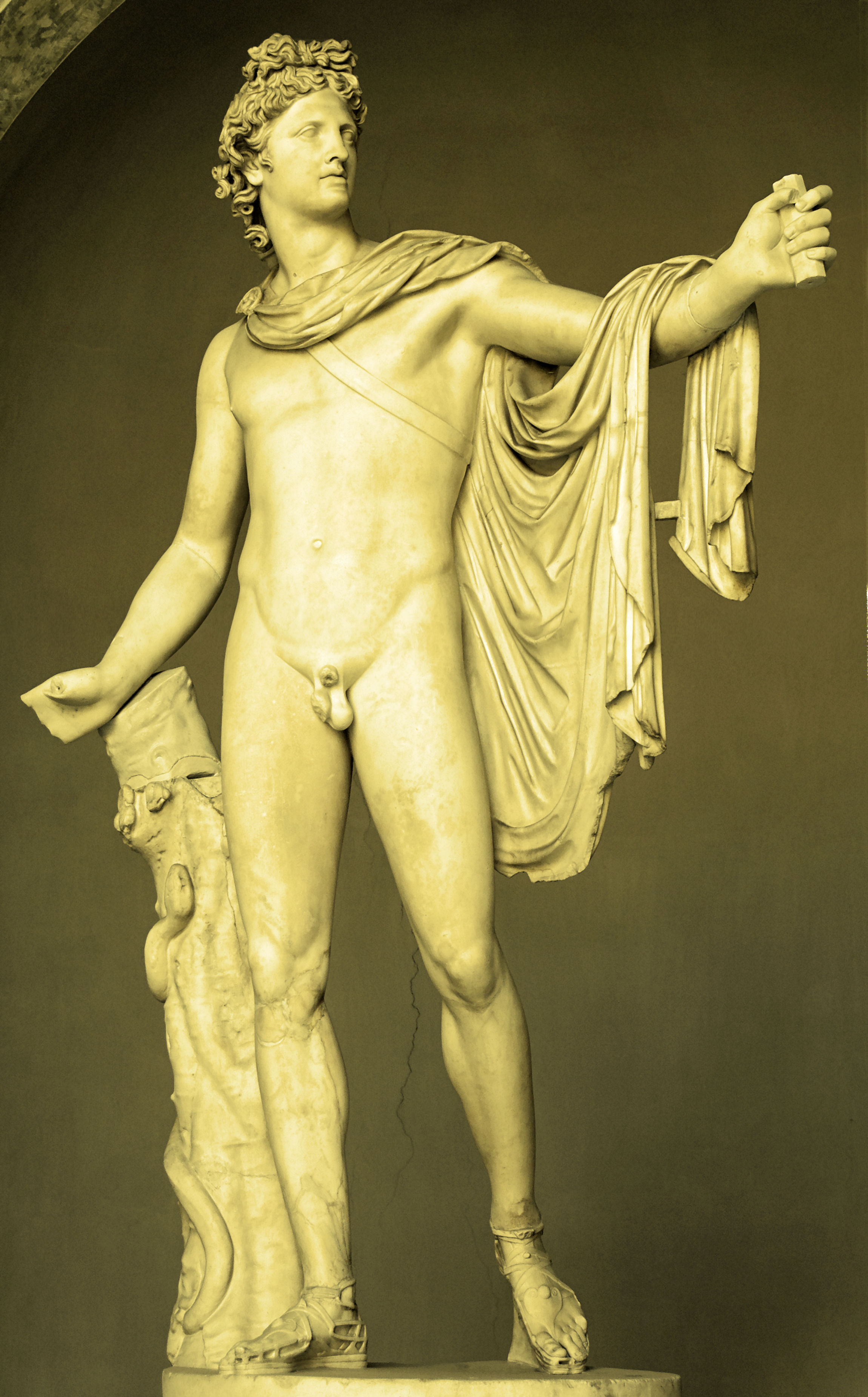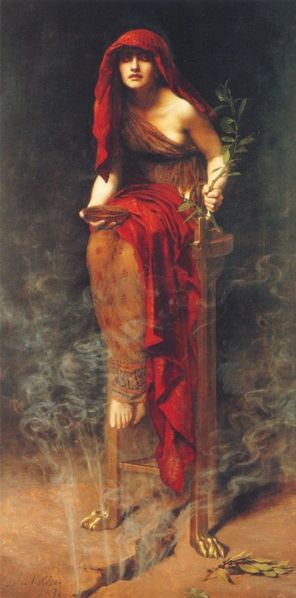Delphi was the most well known Oracle of Apollo, possibly because it was the closest one to the writers of Athens who left the most records for us. Apollo was associated with over a dozen oracles throughout the eastern Mediterranean, one of the world's first franchise operations. This blog honors the prophecy and the spirit of Pythian Apollo.
The Priestesses of Apollo were known as Pythias. They were always women with simple, pure backgrounds, deeply respected because of their infinite wisdom. These priestesses of Apollo allowed him to take over their own spirits so he could advise people from all over the ancient world. A Pythia would devote her life and her spirit to Apollo, and would be honored anywhere. The Pythia of Delphi was arguably the most powerful woman of the ancient world.
Apollo took over the town of Pytho after killing the serpent goddess, Python, who had claimed that area in her name. He slew her in her home, a cave located at the foot of Mt. Parnassus. Legend states that the middle of the earth is the site where Apollo killed Python. He placed a marker on that spot which he named the omphalos stone. Omphalos is defined as the "center of the earth."
But Python was the daughter of Gaia, the earth mother, and even this awesome god needed to purify himself after Python's slaughter. He established the Pythian Games, forerunner of the Olympics, he bathed in the springs of Delphi and he retained the priestess of the Python, who had already been revealing the oracle's wisdom. He had to serve as shepherd for nine years to king Admetus. Then Apollo went to the god of the fields and convinced Pan to educate him in the art of prophecy. He returned to Pytho and renamed it Delphi, after the dolphins which he sent out to attract sailors from Crete and bring them to Delphi to become his priests. Homer has a detailed account of the sailors from Crete in his Hymn to Pythian Apollo. They built a lovely temple around the cave in Mt. Parnassus which contained the original oracle.
But Python was the daughter of Gaia, the earth mother, and even this awesome god needed to purify himself after Python's slaughter. He established the Pythian Games, forerunner of the Olympics, he bathed in the springs of Delphi and he retained the priestess of the Python, who had already been revealing the oracle's wisdom. He had to serve as shepherd for nine years to king Admetus. Then Apollo went to the god of the fields and convinced Pan to educate him in the art of prophecy. He returned to Pytho and renamed it Delphi, after the dolphins which he sent out to attract sailors from Crete and bring them to Delphi to become his priests. Homer has a detailed account of the sailors from Crete in his Hymn to Pythian Apollo. They built a lovely temple around the cave in Mt. Parnassus which contained the original oracle.
On the morning of the day the oracle might be given, the Pythias underwent a purification ceremony. They were accompanied by two high priests and the Hosioi, five members of the council. Servants from the temple also came. Steps of the preparation were:
- Wash in the sacred spring, Castalian, while the priests chanted prayers.
- Drink the waters of another sacred spring, Cassotis.
- Then they were led back up to the temple.
In order to find out if any oracles could be delivered that day, the priests sprinkled cold water on a goat. If the goat shivered, oracles could be delivered. The goat was then sacrificed to Apollo. The smoke from the fire rose in the air to show the clients that they could come with their questions. If the goat did not react, no oracles could be given that day, meaning that there would be no oracles for that month. Plutarch of Rome recorded part of the process:
"No oracle is given if the victim does not tremble and shake throughout its whole body, right to the extremity of its hooves, while it is dedicated. It does not suffice if it shakes its head as with other sacrifices, it is necessary that all its members shiver and shake together with a rattling noise. In default of these signs it is declared that the oracle does not function, and the Pythia is not introduced to it."
When oracles could be given, a Pythia would have to be put into a trance, therefore allowing Apollo to enter her. She inhaled smoke from a fire which burned barley and laurel leaves allowing Apollo to enter her body. She also chewed on laurel leaves. When she entered the trance, the priests carried her into adytum, the cave where the Python once lived. They placed her on a tripod behind a curtain, and mystical vapors would come up from within the mountain. The vapor was said to be the pneuma, the breath of Apollo himself. The priestess held a cord attached to the omphalos stone in one hand. In the other hand, she held more laurel leaves. She sat there unconscious, waiting for Apollo to possess her.
The clients, mostly males, who came for advice from the Oracle of Delphi ranged from farmers to leaders of large empires. The fee for consulting the oracle was not trivial: Homer tells of people bringing hecatombs, defined as one hundred cattle. A client would ask the priests their questions. Clients were not allowed in the adytum, so they waited in the waiting room for an answer. The priest would then ask the Pythia the client's question and wait to record the answer.
Soon the laurel leaves began to shake and mysterious music would be heard. This meant that Apollo had entered the body of the unconscious Pythia. The oracle was delivered in either prose or verse. (Verse was not used between 100 BCE and 100 CE.) Apollo's prose and his verses were very complicated and hard to understand. Priests translated them, but the oracles were often misinterpreted. After speaking, Apollo left the Pythia's body and she came out of the trance. She remembered very little, if any, of what had happened.
In spite of all the wealth Delphi received from oracles, it was repeatedly invaded. Delphi was defeated by the Roman Empire during Rome's conquest of Greece, but the Pythian priestesses delivered oracles until 390 B.C.E. The last documented oracle we know of says:
Tell the king the fair-wrought house has fallen.
No shelter has Apollo, no sacred laurel leaves.
The fountains now are silent.
The voice is still.
No shelter has Apollo, no sacred laurel leaves.
The fountains now are silent.
The voice is still.
The god of medicine, music and poetry, choir director of the nine muses and creator of light and power for the universe fell silent for a really long time. He speaks today of the experience then:
"We had a strong and honorable tradition which lasted for nearly a millennium, but its time was over. The priests were no longer honorable, they were abusing my beloved priestesses, the energy was all wrong and the people stopped coming because it didn't feel right. It was not like I didn't have anything to say. They just didn't deserve to hear it.
"Today I do not speak through many and I do not broadcast widely but I like you humans and I like to help those who can be helped. Keep your energy clean, strive to have your goals clear, and listen carefully for my voice. I love you humans - and I can still be incredibly helpful."

